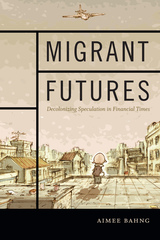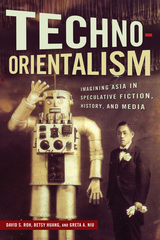2 books by Bahng, Aimee

Migrant Futures
Decolonizing Speculation in Financial Times
Aimee Bahng
Duke University Press, 2018
In Migrant Futures Aimee Bahng traces the cultural production of futurity by juxtaposing the practices of speculative finance against those of speculative fiction. While financial speculation creates a future based on predicting and mitigating risk for wealthy elites, the wide range of speculative novels, comics, films, and narratives Bahng examines imagines alternative futures that envision the multiple possibilities that exist beyond capital’s reach. Whether presenting new spatial futures of the US-Mexico borderlands or inventing forms of kinship in Singapore in order to survive in an economy designed for the few, the varied texts Bahng analyzes illuminate how the futurity of speculative finance is experienced by those who find themselves mired in it. At the same time these displaced, undocumented, unbanked, and disavowed characters imagine alternative visions of the future that offer ways to bring forth new political economies, social structures, and subjectivities that exceed the framework of capitalism.
[more]

Techno-Orientalism
Imagining Asia in Speculative Fiction, History, and Media
Roh, David S.
Rutgers University Press, 2015
What will the future look like? To judge from many speculative fiction films and books, from Blade Runner to Cloud Atlas, the future will be full of cities that resemble Tokyo, Hong Kong, and Shanghai, and it will be populated mainly by cold, unfeeling citizens who act like robots. Techno-Orientalism investigates the phenomenon of imagining Asia and Asians in hypo- or hyper-technological terms in literary, cinematic, and new media representations, while critically examining the stereotype of Asians as both technologically advanced and intellectually primitive, in dire need of Western consciousness-raising.
The collection’s fourteen original essays trace the discourse of techno-orientalism across a wide array of media, from radio serials to cyberpunk novels, from Sax Rohmer’s Dr. Fu Manchu to Firefly. Applying a variety of theoretical, historical, and interpretive approaches, the contributors consider techno-orientalism a truly global phenomenon. In part, they tackle the key question of how these stereotypes serve to both express and assuage Western anxieties about Asia’s growing cultural influence and economic dominance. Yet the book also examines artists who have appropriated techno-orientalist tropes in order to critique racist and imperialist attitudes.
Techno-Orientalism is the first collection to define and critically analyze a phenomenon that pervades both science fiction and real-world news coverage of Asia. With essays on subjects ranging from wartime rhetoric of race and technology to science fiction by contemporary Asian American writers to the cultural implications of Korean gamers, this volume offers innovative perspectives and broadens conventional discussions in Asian American Cultural studies.
[more]
READERS
Browse our collection.
PUBLISHERS
See BiblioVault's publisher services.
STUDENT SERVICES
Files for college accessibility offices.
UChicago Accessibility Resources
home | accessibility | search | about | contact us
BiblioVault ® 2001 - 2024
The University of Chicago Press









